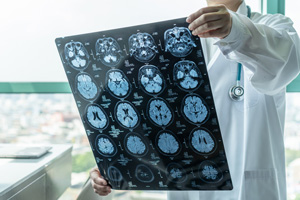Little Rock Brain Injury Attorney
Skilled Brain Injury Attorneys in Little Rock, Arkansas
 The Pfeifer Law Firm in Little Rock, Arkansas, has extensive experience handling various injury cases, including traumatic brain injuries. These cases often involve complex considerations, such as medical evidence, accident liability, and interactions with insurance companies. Brain injuries can result from gross negligence, making it crucial for the injured party to consult an attorney familiar with these types of cases. Understanding your rights and the potential damages is essential before agreeing to any settlement. Having an experienced Little Rock brain injury attorney on your side ensures that no detail is overlooked and all avenues of compensation are explored before settlement. We offer free consultations and will answer any questions you have. When you call, you will speak directly with an attorney. Weekend and after-hour consultations are available by appointment. The call is free, and you won’t owe us anything unless we recover money for you.
The Pfeifer Law Firm in Little Rock, Arkansas, has extensive experience handling various injury cases, including traumatic brain injuries. These cases often involve complex considerations, such as medical evidence, accident liability, and interactions with insurance companies. Brain injuries can result from gross negligence, making it crucial for the injured party to consult an attorney familiar with these types of cases. Understanding your rights and the potential damages is essential before agreeing to any settlement. Having an experienced Little Rock brain injury attorney on your side ensures that no detail is overlooked and all avenues of compensation are explored before settlement. We offer free consultations and will answer any questions you have. When you call, you will speak directly with an attorney. Weekend and after-hour consultations are available by appointment. The call is free, and you won’t owe us anything unless we recover money for you.
Traumatic brain injuries can result from any accident involving a blow to the head that causes brain trauma. These incidents include car accidents and other high-speed impacts, falls, sports or boating accidents, swimming pool accidents, and even whiplash. Such accidents may be caused by a defective product, such as an automobile’s safety features, or by the careless or negligent actions of another person.
According to the Centers for Disease Control and Prevention, approximately 5.3 million Americans live with disabilities due to some type of brain injury. Most of these injuries are concussions, which may or may not involve a loss of consciousness. Symptoms of traumatic brain injury can vary and might not appear immediately. This underscores the importance of proper medical treatment and diagnostic testing when a brain injury is suspected. Here are some key points:
Common Symptoms:
- Headaches, Seizures, Loss of consciousness, Dizziness, Blurred vision, Memory problems, Trouble with concentration, Fatigue, Confusion, Unusual mood changes, Slurred speech, and Disorientation
Symptom Onset:
- Symptoms can be subtle and might not seem serious initially.
- Symptoms may not appear immediately after the accident or injury but could manifest later.
Diagnostic Technologies:
- MRI
- CT scan
- PET scan, which uses computer technology to produce detailed images of the brain, helping doctors identify affected areas.
Medical Evaluation:
- Victims of traumatic brain injuries must be evaluated by neurologists who can detect even the most subtle symptoms and determine appropriate treatment steps.
- In our experience, evaluation by a neuropsychologist is essential to assess the extent of the brain injury.
Traumatic brain injuries often have long-term effects, even in mild cases. These can include personality and behavioral changes, vision problems, and difficulties with memory and concentration. Patients may struggle at school or work, and family members might notice mood swings, irritability, depression, insomnia, anxiety, and other issues. More serious effects can involve permanent disability, such as loss of motor function, disfigurement, and balance problems, which may manifest as dizziness, vertigo, or vision issues. These effects can be permanent, significantly impacting daily life. About half of patients with traumatic head injuries require surgery to repair broken blood vessels in the head or brain, or to remove damaged brain tissues. The most severe injuries can result in comas or recurring seizures over the patient’s lifetime.
Diagnosing Brain Injuries and Causes
Diagnosing and treating brain injuries can be very expensive. Patients need to be evaluated and treated by neurologists and other specialists to get an accurate diagnosis of their condition. This often involves close monitoring to see if any symptoms worsen or if new ones develop. Once the problem is identified, the doctor will determine the best course of treatment for the patient. Treatments can include anti-seizure medication, surgery to remove blood clots, and surgery to repair skull fractures caused by an accident.
Ongoing treatment and therapy are crucial for patients who want to return to their normal lives. Brain injury victims may need the assistance of psychiatrists, psychologists, occupational and physical therapists, speech pathologists, and rehabilitation nurses. They might also require special equipment at home to aid with mobility, as loss of motor function is a common effect of brain injury. These treatments can be costly, and victims and their families may struggle to cope with the financial burden, especially if the injured person was the primary wage earner. An experienced traumatic brain injury lawyer can help navigate the emotional and financial challenges of such a traumatic accident.
Contact Our Little Rock Brain Injury Attorneys Today
If you or a loved one has suffered a traumatic brain injury, you need an experienced Little Rock brain injury attorney to handle your case. We can assess your situation to determine if you are eligible for compensation to alleviate the financial burden of treatment, as well as damages for pain and suffering and lost earnings due to disability. Call our Little Rock personal injury lawyers today for a free consultation or contact us online.

